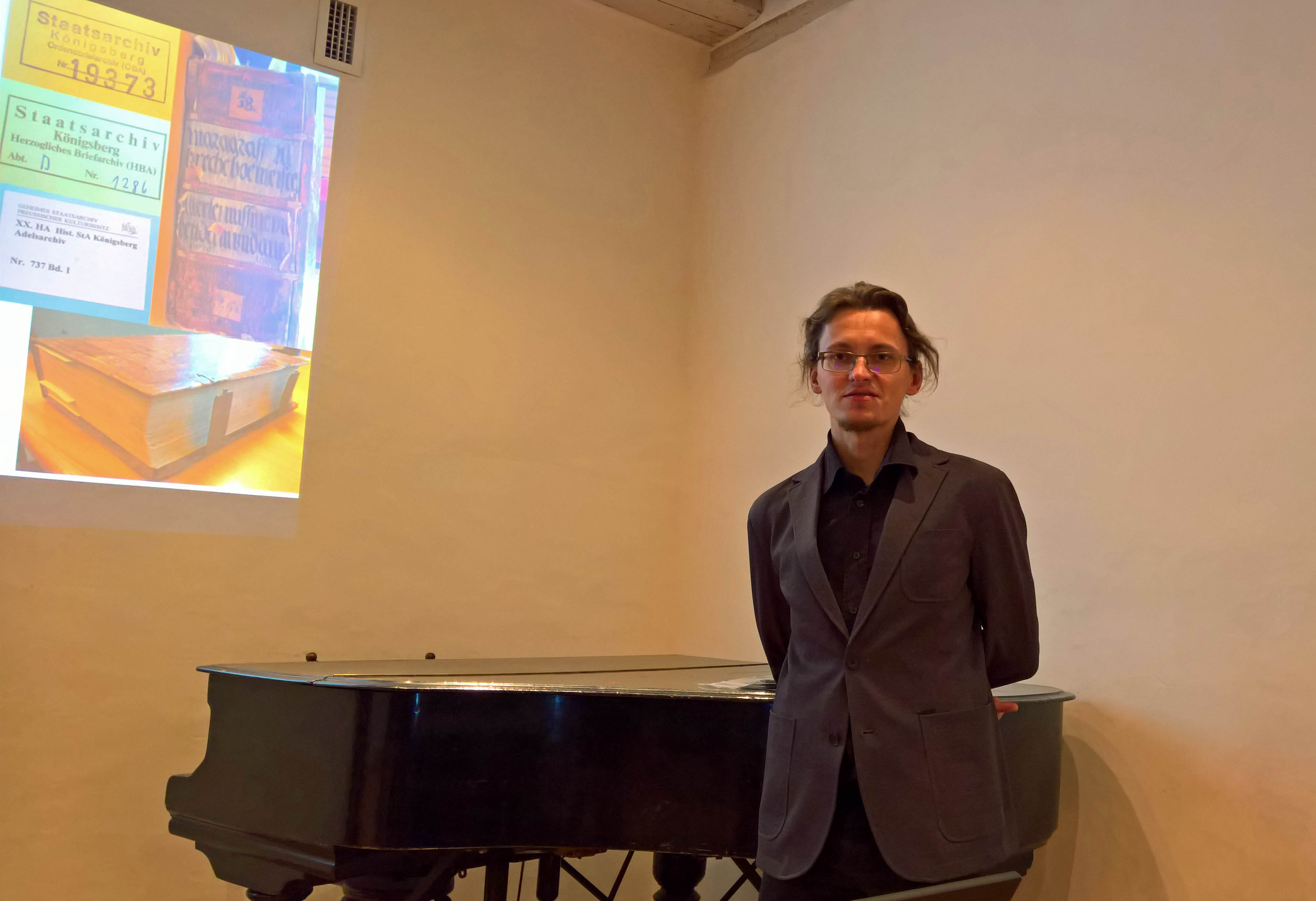Centre for Medieval Studies
The Centre for Medieval Studies is an academic research network of the Tallinn University.
The Centre has three main aims:
- to create an innovative and supportive forum for scholars working with the Middle Ages;
- to encourage and initiate interdisciplinary research and collaboration;
- to coordinate, promote and offer information about medieval studies in Estonia.
The major emphasis of the Centre's research focuses on the medieval Europeanization process and the cross-cultural interaction in the frontier areas, with a special emphasis on the comparative research into the political, social, economic, cultural and religious integration of the Baltic Sea region (10th-16th centuries).
The Centre co-operates with national and international scientific programs; regularly holds seminars, lecture-series and conferences; launches research projects; as well as develops multidisciplinary curricula for academic graduate and postgraduate training in medieval studies at the University of Tallinn.
The Centre was officially formed in 2005, since 2015 it is part of the Institute of History, Archaeology and Art History. It brings together researchers and postgraduate students from various Estonian universities and research institutions, involving a wide range of disciplines, such as history, archaeology, art history, theology, and folklore and literature studies.
Head of the Centre for Medieval Studies:
Former heads:
2022-2023 Villu Kadakas
2020-2021 Anu Mänd
2018-2019 Inna Jürjo
2016-2017 Linda Kaljundi
2010-2015 Juhan Kreem
2005-2010 Kersti Markus
Members
International Council
- Prof. Sverre Bagge
- Prof. Gerhard Jaritz
- Prof. Jüri Kivimäe
- Dr. Tuomas M.S. Lehtonen
- Prof. Jean-Claude Schmitt
Events
Seminar of the Centre for Medieval Studies
Date: 25 November 2021, at 16.15
Speaker: Riina Rammo (University of Tartu)
Subject: Carved in Stone: Analysis of the Clothing of the Sculpture Groups in the Pöide and Karja Churches, Saaremaa
Abstract: Riina Rammo is currently leading the project “Clothing and self-identity in the 11th–16th centuries in Estonian territory“, funded by the Postimees Foundation. The main sources for her project are archaeological finds, but also textual and visual evidence. In her paper, Riina discussed the clothing of two medieval sculpture groups in the churches of Pöide and Karja, which most likely represent indigenous people. Although these sculptures have been studied before, the details of their clothing have not been sufficiently analysed. The paper focussed on the questions of how these figures differ from the rest of the sculptures and which details of local rural dress can be observed on them.
The seminar was chaired by Anu Mänd.
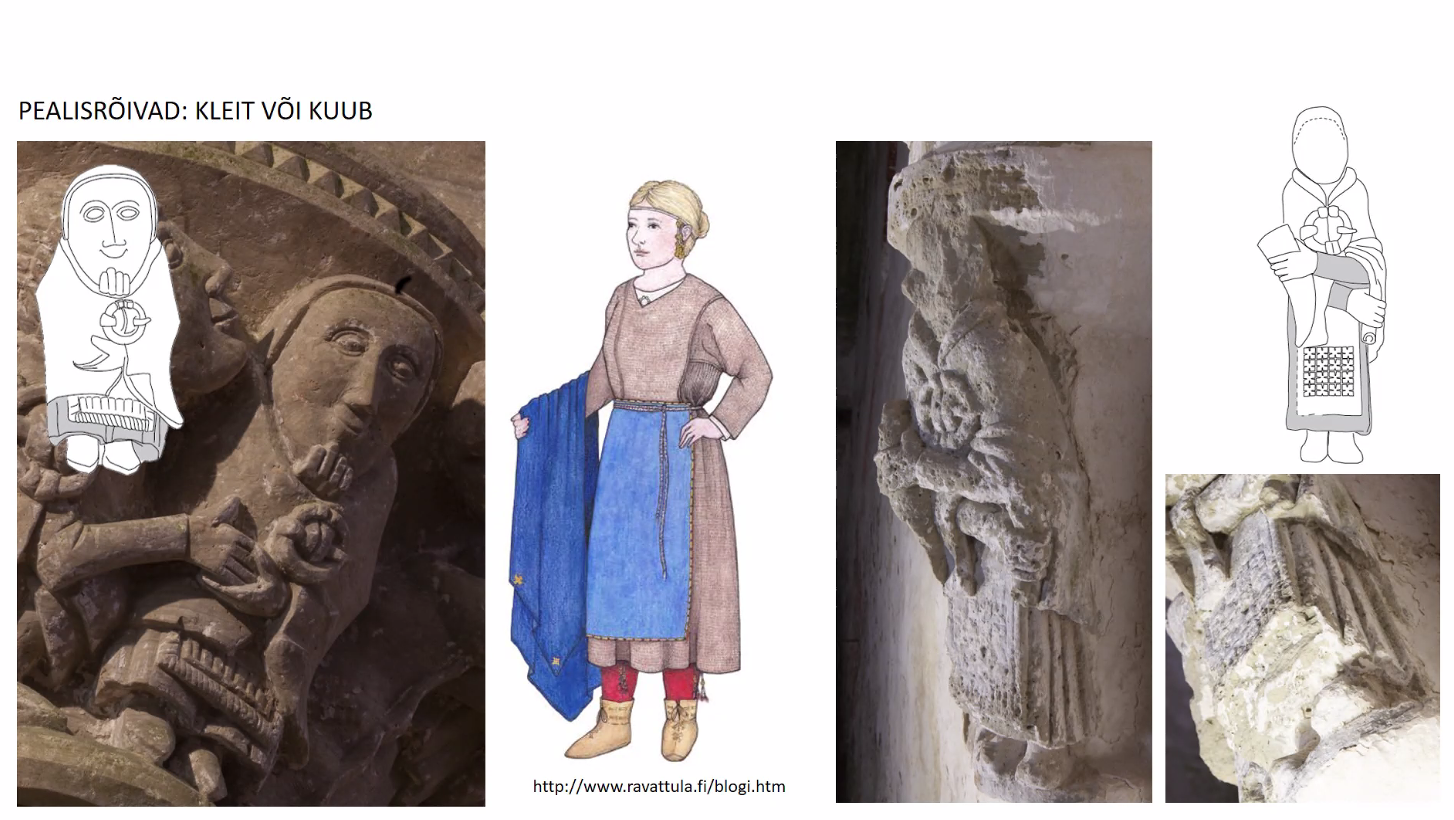
Seminar of the Centre for Medieval Studies in Co-operation with the “Digital Livonia” Project
Date: 21 October 2021, at 16.00
Speaker: David Zbíral (Mazaryk University, Brno)
Subject: Towards the computational modelling of social, spatial, and discursive patterns of medieval dissidence and inquisition: Introducing the Dissident Networks Project (DISSINET)
Abstract: David Zbíral’s research focuses on medieval religious nonconformism and its repression. Currently, he leads the "Dissident Networks Project” (DISSINET), which uses computational methods to shed new light on the social microstructure and spatiality of dissident religious cultures in medieval Europe and, by extension, on medieval social networks. The project was recently supported by the prestigious ERC grant (2021–2026). In his presentation, David introduced the first result of the project.
The seminar was chaired by Marek Tamm.
Seminar of the Centre for Medieval Studies
Date: 30 September 2021, at 16.15
Speaker: Lembi Lõugas (TLU Archaeological Research Collection)
Subject: Foreign Seafood in Archaeological Finds
Abstract: The paper discussed the possibilities of identifying foreign fish species and other seafood in the archaeological finds of Estonia. It is the easiest to detect species who live in the Atlantic, including the North Sea. More difficult are the cases when a fish can be found both in the Atlantic and the Baltic Sea. The paper introduced the modern methods used in archaeozoology and discussed the relation between foreign and local seafood in medieval diet.
The seminar was chaired by Anu Mänd.
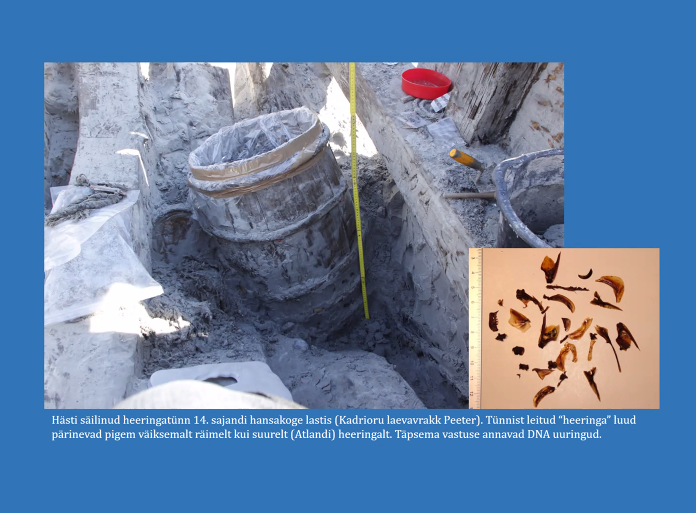
Conference on Danish-Estonian Relations in the Middle Ages
Date: 11-12 September 2021
Speaker: 12 speakers
Subject: Danish-Estonian Relations in the Middle Ages
Abstract: On September 11-12, an international conference took place in the maiden’s Tower in Tallinn, where Estonian and Danish historians discussed the political and cultural connections between Denmark and Estonia from the 13th to the 16th century. The keynote lecture was given by Prof. Kurt Villads Jensen from the University of Stockholm. Among the presenters were the following members of the Centre for Medieval Studies: Tiina Kala, Juhan Kreem, Villu Kadakas and Anu Mänd from Tallinn University and Anti Selart, Mihkel Mäesalu and Madis Maasing from Tartu University. Programme of the conference: https://www.linnamuuseum.ee/en/cat-linnamuuseum-en/taani-eesti-ajalooko…. The papers can be found in Youtube.
The conference was organised by Mihkel Mäesalu and Stefan Pajung.
Photo: Prof. Kurt Villads Jensen.
Seminar of the Centre for Medieval Studies
Date: 27 May 2021, at 16.15
Speaker: Ivar Leimus (Estonian History Museum / TLU AAK)
Subject: The Adventurous Life of Ivo Schenkenberg’s Stepfather
Abstract: The activities of Ivo Schenkenberg, called the Hannibal of Livonia, are comparatively well known. But even more adventurous was the life of his stepfather, the mint master Paul Gulden, who after a career in Tallinn, an imprisonment in Moscow and working for the king of Denmark acquired the position of the ducal mint master and a courtier in Prussia. He also remained connected to Tallinn. Studies of his correspondence shed new light on his inheritance affairs and on the death of his stepson Ivo. The paper is based on years of thorough archival research. As a result, a novel on Paul Gulden was published in May 2021 (in Estonian).
The seminar was chaired by Anu Mänd.
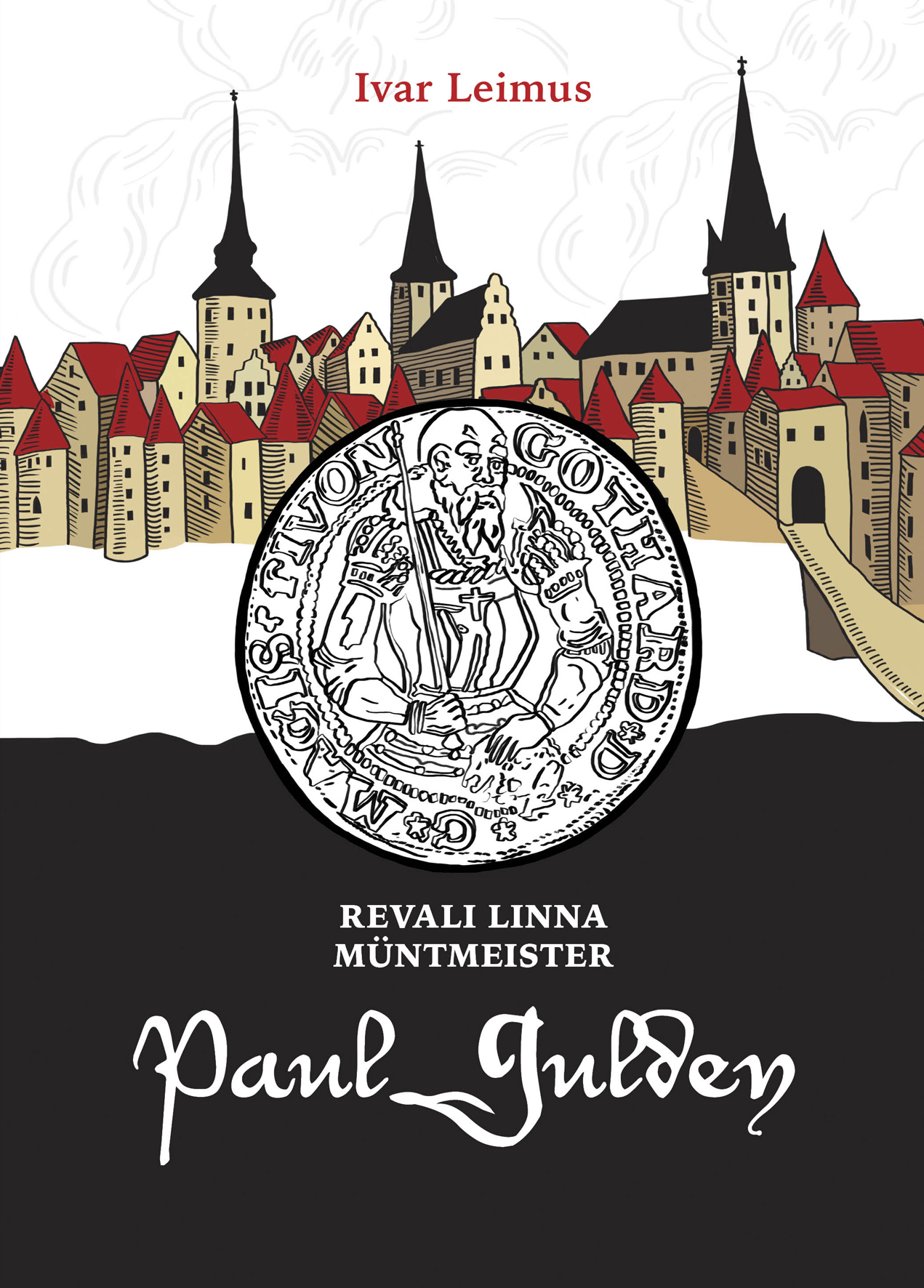
Seminar of the Centre for Medieval Studies
Date: 22 April 2021, at 16.15
Speaker: Juhan Kreem (Tallinn City Archives / TLU AAK)
Subject: Four Weddings and a Funeral. Johann von der Recke in Viljandi (1535–1551)
Abstract: Johann von der Recke was in 1535–1549 the Commander of the Teutonic Order in Viljandi and in 1559–1551 the Livonian Master. When acting as the Master, he kept the castle of Viljandi for himself; he also died and was buried there. As a Commander and from 1541 as the Master’s coadjutor, Recke was an influential official of the Order for almost two decades. The paper presents new discoveries about the origin of Johann von der Recke, as well as about his networks in Westphalia and Livonia, based on his letters in the Höllinghöfen archives.
The seminar was chaired by Anu Mänd.
Illustration: the seal of Johann von der Recke.
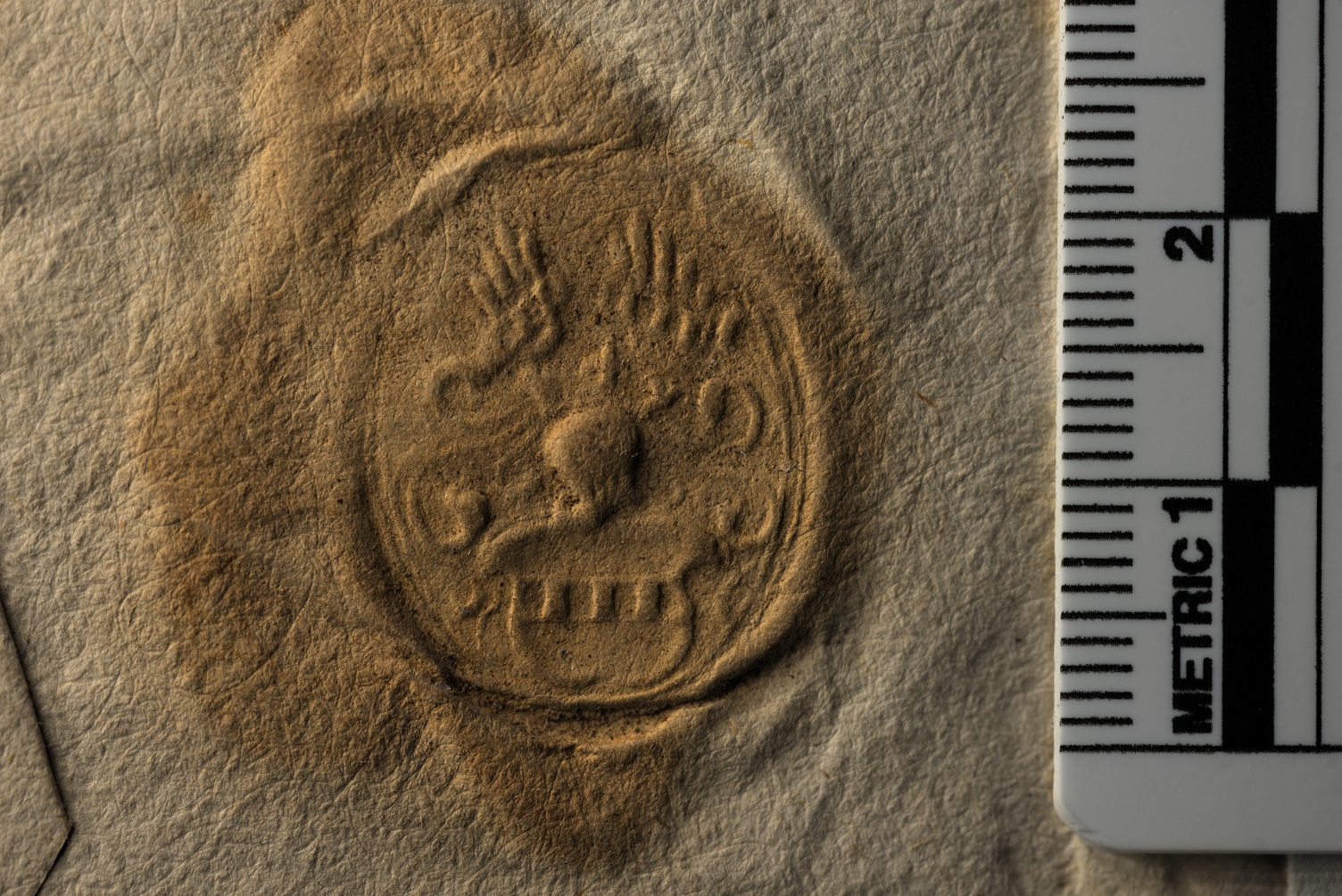
Seminar of the Centre for Medieval Studies
Date: 25 March 2021, at 16.15
Speaker: Mihkel Mäesalu (Tartu University)
Subject: Danish Vicegerent Konrad Preen and St. George’s Night Uprising
Abstract: The Uprising on St. George’s Night in 1343 has usually been treated as a German-Estonian conflict, in which the Danish vicegerent played no role. This paper presents different points of view. First, it will be argued that in the years before the uprising, the vicegerent Konrad Preen collected extra taxes in northern Estonia, which could be one of the reasons for the uprising. Second, the Teutonic Order arrested Konrad Preen, probably in May 1343 and kept him in prison in the Paide castle until the summer of 1344. Thus, it is possible that the Livonian Master Burchard von Dreileben used the uprising as an excuse to occupy the Danish territories in northern Estonia.
The seminar was chaired by Anu Mänd.
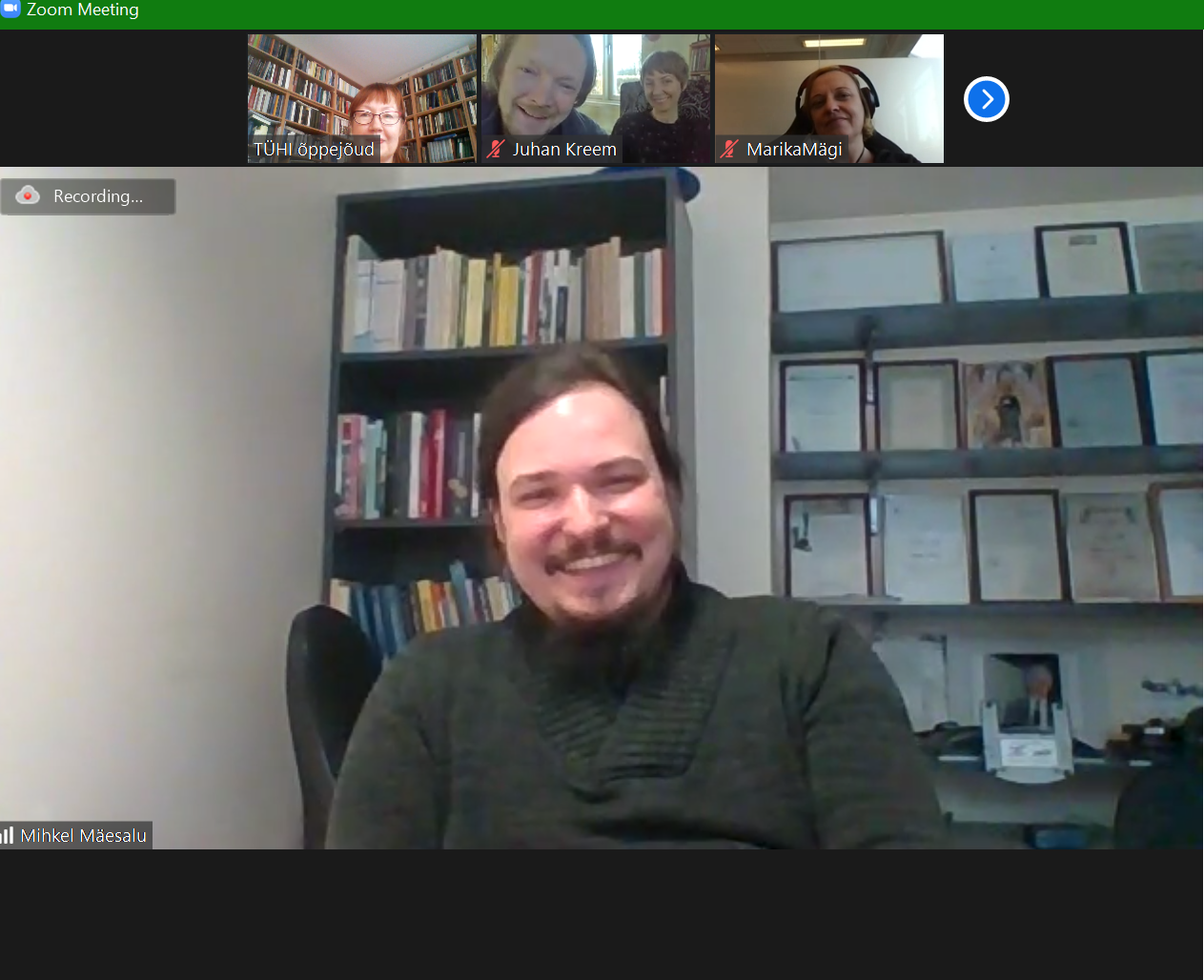
Seminar of the Centre for Medieval Studies
Date: 25 February 2021, at 16.15
Speaker: Heiki Valk (Tartu University)
Subject: Sacral Fragmentary. New Archaeological Data for Medieval South-Estonia from 2017–2021
Abstract: Recent archaeological studies of sacral places in South-Estonia have added valuable information on medieval culture and popular devotion. The presentation introduced the results of excavations in the 13th-century cemetery in Urvaste, in the location of a former chapel or chapel ruins in Loosi and Helme, in the churchyard of Nõo, and the church of Rannu. Keywords: cemeteries of the transition period, the foundation of rural chapels, sacred topography, church fairs and finds of coins.
The seminar was chaired by Anu Mänd.
Illustration: reconstruction of the holy site preceding the stone chapel of Helme.
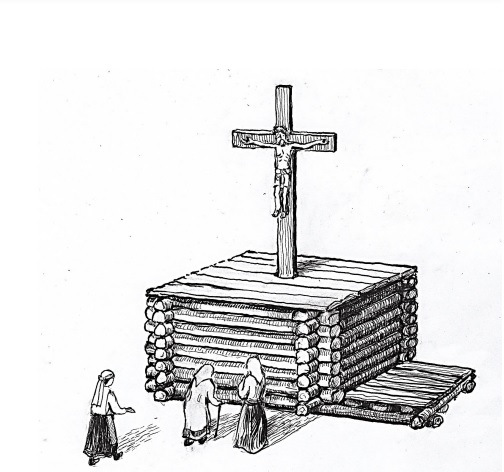
Seminar of the Centre for Medieval Studies
Date: 28 January 2021, at 16.15
Speaker: Anton Pärn (Foundation of Haapsalu and Läänemaa Museums)
Subject: Medieval Haapsalu – Town Plan, Plots, and Town Wall – in the Light of Recent Excavations
Abstract: The last three years have been very fruitful for the studies of the urban space of medieval Haapsalu. Today it is possible to reconstruct the location of the town wall, and to experience the urban topography until the end of the medieval era. Excavations in the plot of Linda Street 3 added valuable knowledge on the dynamics of urban space in the 13th century. In the seminar, topics such as urban planning, the development of the street network and the emergence of plots were discussed.
The seminar was chaired by Anu Mänd.
Illustration: Plot of 3 Linda Street, aerial photo 2020.
2020
Seminar of the Centre for Medieval Studies in cooperation with the lecture series “Cats, Dogs, and Artists” of the Art Museum of Estonia
Date: 28 October 2020, at 18:00
Location: Kadriorg Art Museum
Speaker: Anu Mänd (Tallinn University)
Subject: The Good and the Bad: Cats and Dogs in Medieval Art
Abstract: Animals in medieval Christian art were often used as symbols or allegories, referring to human vices and virtues or symbolising the everlasting battle between good and evil. Many animals, including cats and dogs, had more than one meaning and, depending on the context, they could act as positive or negative characters. Cats and dogs were included in the paintings of several well-known artists, such as Jan van Eyck and Pietro Lorenzetti, but also by Hermen Rode and Bernt Notke, who created altarpieces for churches in the Baltic Sea region. In the lecture, the multiple meanings of cats and dogs in art were discussed and special attention was paid to the animal symbolism in late medieval altarpieces in Tallinn.
The seminar was chaired by Tiina-Mall Kreem.
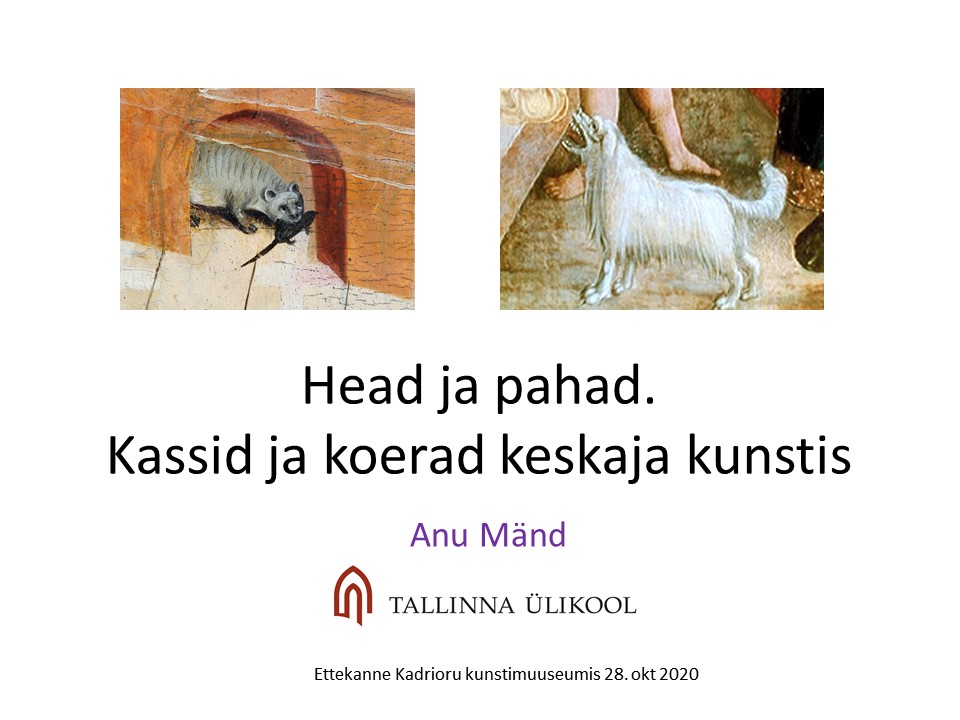
The 15th Anniversary of the Centre for Medieval Studies
Date: 29 September 2020, at 16:30
Location: Tallinn City Archives
Speakers: Inna Jürjo, Kersti Markus, Marek Tamm, Krista Kodres, Erki Russow, Tiina-Mall Kreem
Abstract: In the Autumn of 2020, fifteen years passed from the foundation of the Centre for Medieval Studies. It was celebrated by the launching of six books, authored or edited by members of the Centre and published this year:
Inna Põltsam-Jürjo. Viin, vein ja vesi. Joogikultuur Eestis kesk- ja varauusajal. Tallinn: Argo.
Kersti Markus. Visual Culture and Politics in the Baltic Sea Region 1100-1250. Leiden & Boston: Brill.
Anu Mänd & Marek Tamm (eds.). Making Livonia: Actors and Networks in the Medieval and Early Modern Baltic Sea Region. London & New York: Routledge.
Krista Kodres, Merike Kurisoo, Ulrike Nürnberger (eds.). Indifferent Things? Objects and Images in Post-Reformation Churches in the Baltic Sea Region. Petersberg: Michael Imhof Verlag.
Erki Russow. Lood ja leiud Tallinna algusest. Tallinn: Stilus.
Alati meie kõrval. Kassid ja koerad 16.−19. sajandi kunstis / Always by Our Side. Cats and Dogs in 16th−19th Century Art. Toim. Tiina-Mall Kreem ja Aleksanda Murre, tekstid Anu Mänd, Anu Allikvee ja Kersti Kuldna-Türkson. Tallinn: Eesti Kunstimuuseum.
The book launch was followed by an informal gathering.
The event was chaired by Anu Mänd.
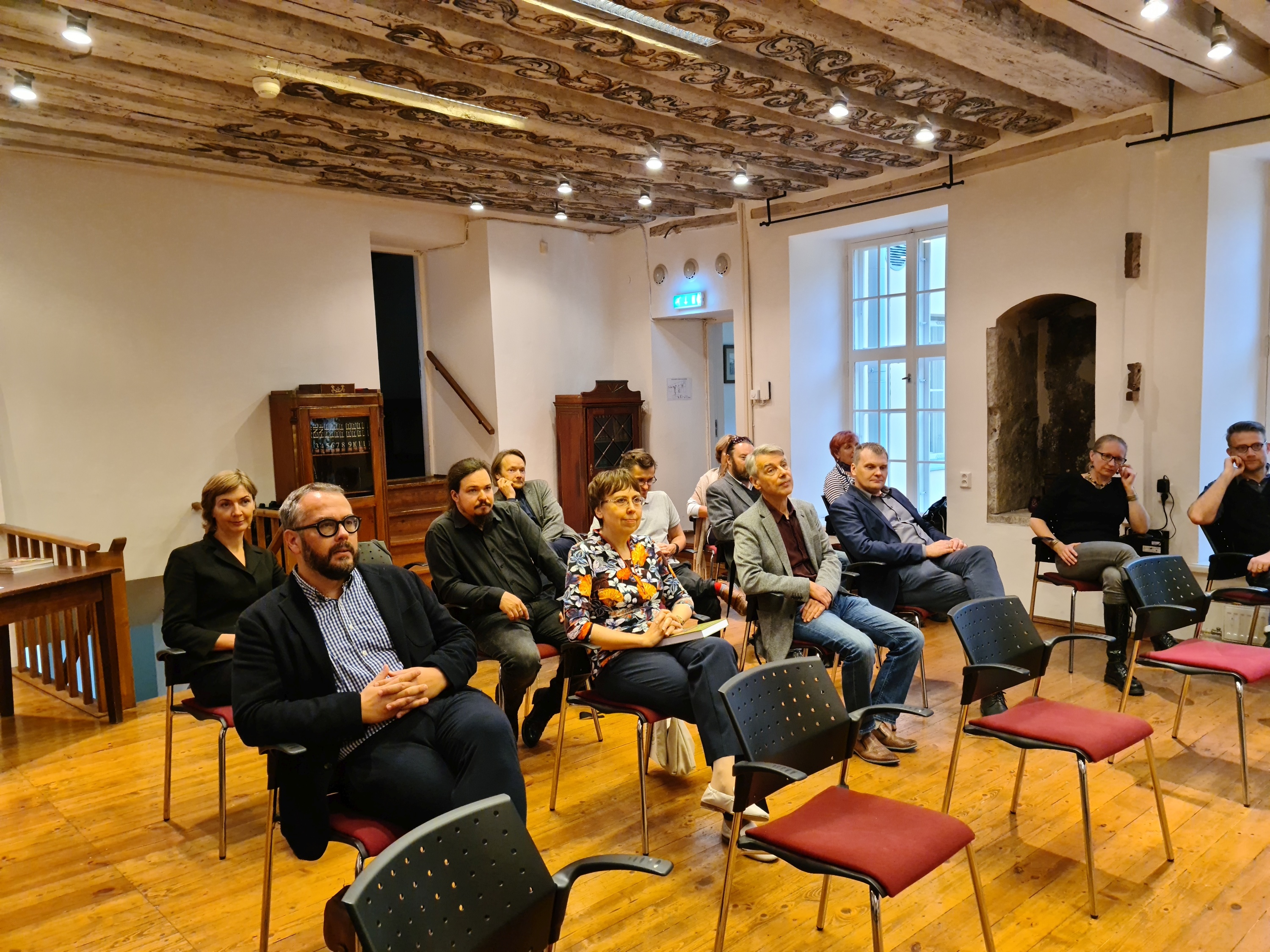
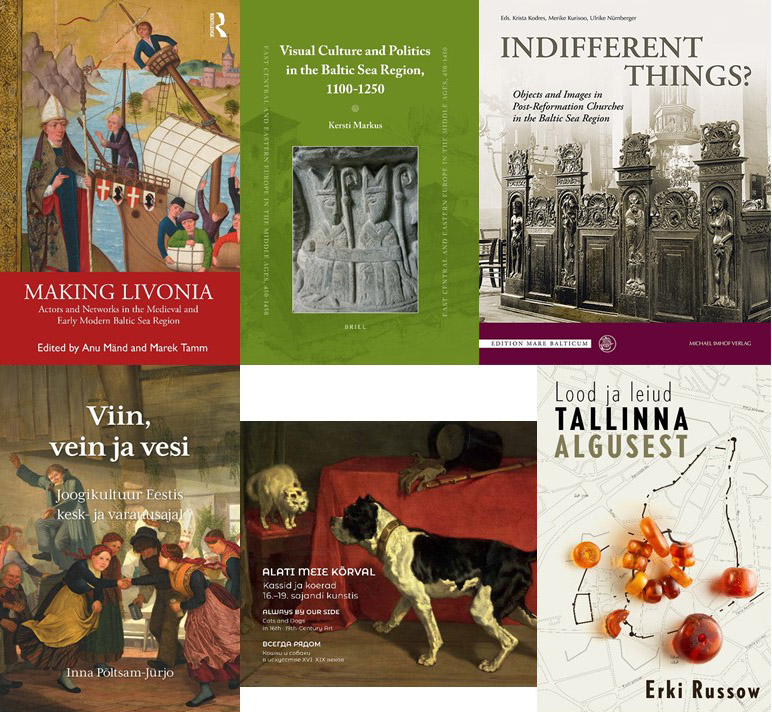
Seminar of the Centre for Medieval Studies
Date: 3 September 2020, at 16.00
Location: Ruins of the Padise monastery
Speaker: Villu Kadakas (Tallinn University)
Subject: On the construction history of the Padise monastery in the light of recent studies
Abstract: Villu Kadakas, who for many years has conducted studies of the building archaeology of the Padise Cistercian monastery, provided an overview of the findings in recent years. During the seminar, the group moved through the different parts of the ruins and discussed the possible functions of rooms. Special attention was paid to architectural details on the floors and walls and to carved stones that were found during the excavations.
The seminar was chaired by Anu Mänd.
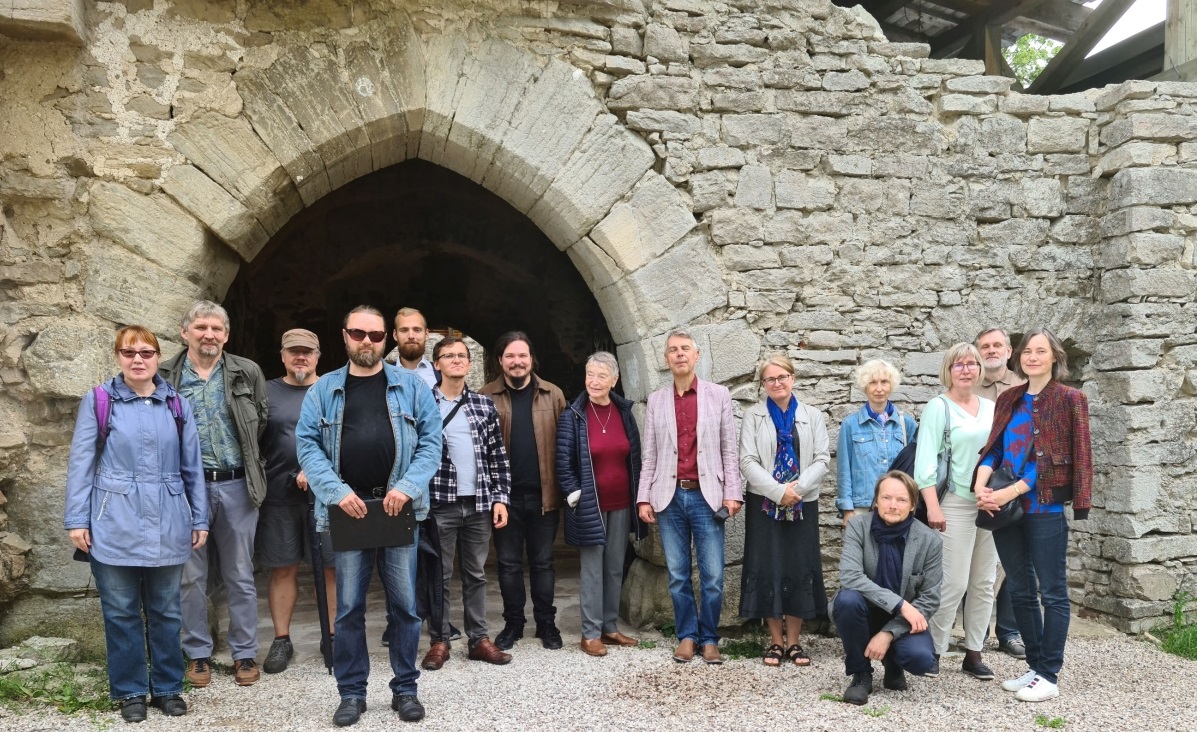
Seminar of the Centre for Medieval Studies
Date: 28 May 2020, at 16:15
Location: via Zoom
Speaker: Karl Peeter Valk (PhD student at Tallinn University & the University of Sorbonne)
Subject: The image of the Teutonic Order in the writings of Philippe de Mézières (1327–1405)
Abstract: Philippe de Mézières, a French knight, diplomat, adviser of kings and popes and a promoter of crusading ideology, travelled widely almost in entire Europe and wrote about it in his main work, Songe du Vieux Pèlerin. In its first part, he addresses critically the political and moral situation in contemporary Europe but praises the Teutonic Order. The positive image of the Order deserves attention, especially because other contemporary institutions and persons were treated critically by de Mézières. The aim of the lecture was to discuss the political and ideological agenda of the author and the possible reasons for a positive image of the Teutonic Order.
The seminar was chaired by Anu Mänd.
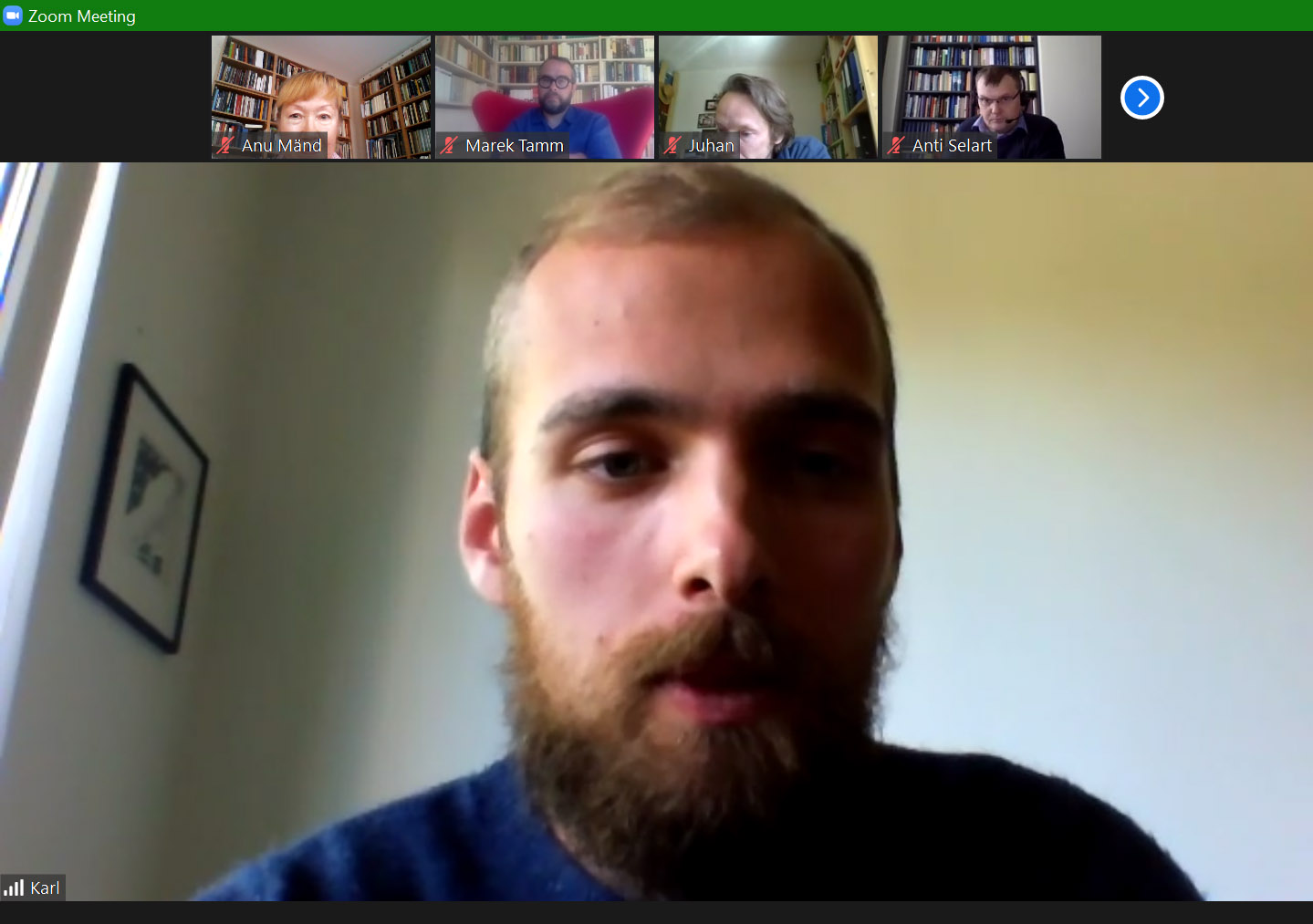
Seminar of the Centre for Medieval Studies
Date: 20 February 2020, at 16:15
Location: Tallinn City Archives
Speaker: Gustavs Strenga (National Library of Latvia / Tallinn University)
Subject: Gifts, religiosity, discipline and memory as tools of group-building. The case of transport workers’ guilds in late medieval Riga
The two transport workers’ guilds – the Beer Carters and Porters were one of the largest urban groups in late medieval Riga. Though founded in the late 14th and early 15th century, they were transformed in the mid-15th century gaining higher status and more prestigious sacral spaces than before. They were hybrid groups, a confraternity like organisations that hosted both ‘non-Germans’ (Latvians and Livs) and also ‘Germans’ from the elites and artisan middle class. This presentation will focus on the use of gifting, religiosity and discipline as elements of group-building between the 1450s and 1470s when these groups experienced a surge of resources and members, focusing on that how these elements helped them to create new identities and communities.
The seminar was chaired by Anu Mänd.
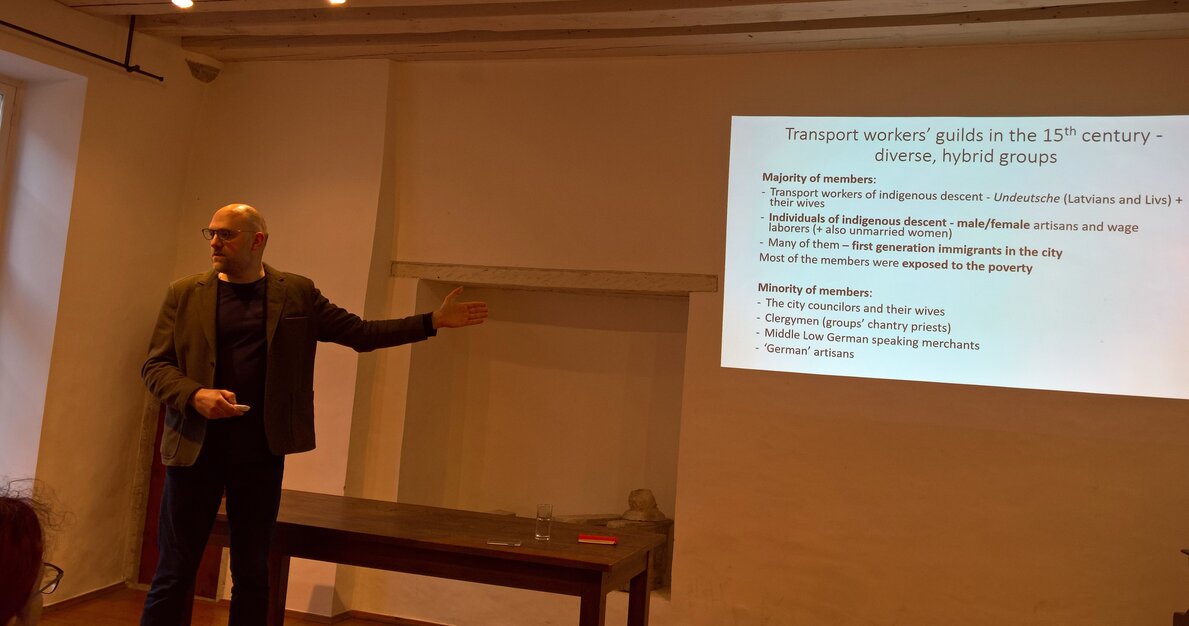
Seminar of the Centre for Medieval Studies
Date: 13 February 2020, at 16:15
Location: Tallinn City Archives
Speaker: Anu Lahtinen (University of Helsinki)
Subject: Nobility in Finland in the Reformation Period: Sources, Questions, and Interregional Connections
Abstract: Historian Anu Lahtinen, presently Professor of History at the University of Helsinki, has thoroughly studied the history of noble families in the Baltic Sea region. In her lecture, she focused on recent research on sixteenth-century nobility in Finland as well as on their interregional connections and pointed out prospects of future research. The presentation was based on her previous and ongoing studies on noble families in the Baltic Sea Region.
Picture: Epitaph of Arvid Stålarm and Elin Fleming
The seminar was chaired by Anu Mänd.
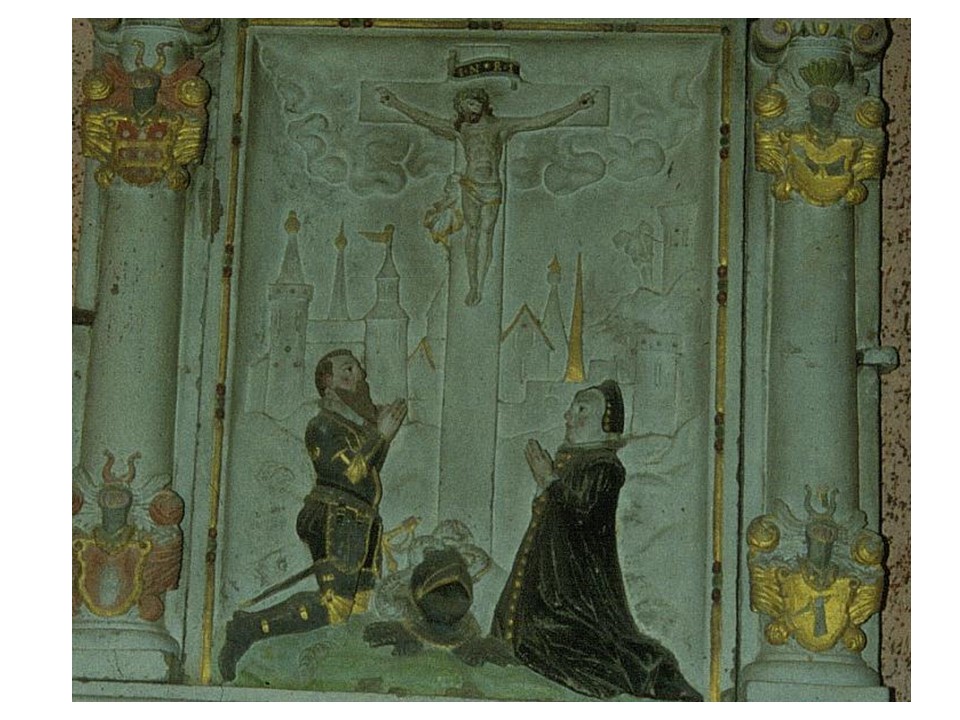
Seminar of the Centre for Medieval Studies
Date: 23 January 2020, at 16:15
Location: Tallinn City Archives
Speaker: Madis Maasing (University of Tartu)
Subject: Livonica in the Prussian Privy State Archives (1511–25 and 1540–50)
Abstract: The years 1511–25 and 1540–50 have not been very popular in the study of Livonian political history, which is partly caused by the lack of published sources. However, there survive plenty of documents from these years in the Prussian Privy State Archives (Geheimes Staatsarchiv Preussischer Kulturbesitz) in Berlin. In the seminar, the preliminary results of Dr Maasing’s three month’s stay in this archive were presented.
The seminar was chaired by Anu Mänd.
